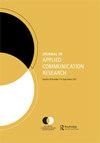#Metoo作为实践社区:中国性骚扰受害者的数字叙事研究
IF 1.7
2区 文学
Q2 COMMUNICATION
引用次数: 1
摘要
在中国,网上披露自己的经历和骚扰者的名字是讲述#MeToo故事的一种突出方式。本文借鉴实践共同体(CoP)的理论视角,对这些信息披露进行叙事分析,探讨如何利用这些信息形成实践共同体,抵抗性骚扰,从而为中国的数字女权主义做出贡献。研究发现,他们塑造了受害者的共同身份,并通过分享创伤经历和反思话语来建立社区,从而维持情感团结。她们用话语的方式揭露骚扰者,包括标记不同的标签、将内容存档以便继续扩散、邀请网民转发信息等,打破沉默,挑战纵容性骚扰的社会环境,构成了一场强有力的数字女权运动。本文通过将cop的理论见解与#MeToo运动相结合,拓展了数字女权主义的研究。本文章由计算机程序翻译,如有差异,请以英文原文为准。
#Metoo as communities of practice: a study of Chinese victims’ digital narratives of sexual harassment
ABSTRACT Online disclosure of one’s own experience and the harasser’s name is a prominent way of telling #MeToo stories in China. Drawing on the theoretical perspective of community of practice (CoP), this article conducts a narrative analysis of these disclosures to explore how they are employed to form communities of practice that serve to resist sexual harassment, thereby contributing to digital feminism in China. The study finds that they shape a common identity as victims and sustain affective solidarity through sharing traumatic experiences and reflective discourses to build the community. Their discursive practice of exposing harassers, including tagging variant hashtags, archiving contents for continued proliferation, and inviting netizens to re-post information, serves to break the silence and challenge the social environment that connives at sexual harassment, constituting a forceful digital feminist movement. By incorporating the theoretical insights of CoPs with the #MeToo movement, the article expands the study of digital feminism.
求助全文
通过发布文献求助,成功后即可免费获取论文全文。
去求助
来源期刊

Journal of Applied Communication Research
COMMUNICATION-
CiteScore
4.00
自引率
8.70%
发文量
52
期刊介绍:
The Journal of Applied Communication Research publishes original scholarship that addresses or challenges the relation between theory and practice in understanding communication in applied contexts. All theoretical and methodological approaches are welcome, as are all contextual areas. Original research studies should apply existing theory and research to practical solutions, problems, and practices should illuminate how embodied activities inform and reform existing theory or should contribute to theory development. Research articles should offer critical summaries of theory or research and demonstrate ways in which the critique can be used to explain, improve or understand communication practices or process in a specific context.
 求助内容:
求助内容: 应助结果提醒方式:
应助结果提醒方式:


